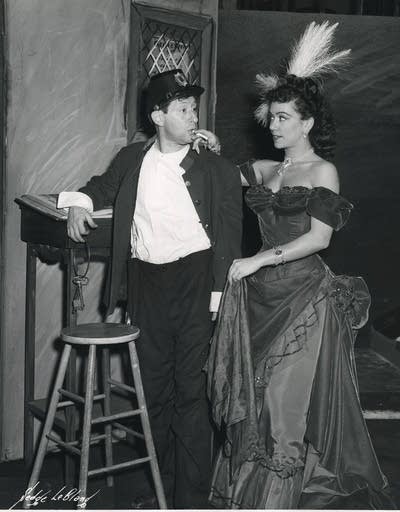
If you were looking for a piece of music theater to ring in the New Year, you couldn't do better than Johann Strauss's Die Fledermaus, which the Metropolitan Opera broadcasts this Saturday. Consider: the whole plot turns around partying, masquerades, chiming timepieces and champagne. And the music — much like the famous Vienna New Year's concert — is a string of dances: galops, polkas, marches and waltzes to set the feet tapping.
In classic operetta fashion, the story is both solidly crafted, and light as a feather. One Gabriel von Eisenstein has been sentenced to serve a short jail term. But instead of going to jail, he unexpectedly gets the opportunity to go to a glamorous party — and his wife will not be attending. Needless to say, this change of plan is also accompanied by a change in identity, as Eisenstein disguises himself as a French nobleman. While at the party, he meets a beautiful Hungarian countess. As we might expect, this is in fact his wife, who by virtue of putting on a mask has become completely unrecognizable. (It's that kind of plot.)

But what makes Fledermaus live is not its plot, but the music, which is tuneful, inventive, and always apt for the theatrical situation at hand. Over the years, it's been admired by some of the world's finest musicians, from Mahler to Bruno Walter to Carlos Kleiber. The Met performance is an archive recording of a beloved production from the 1950s, and the conductor there is no less than Eugene Ormandy. The cast features Met stars of the era, notably mezzo Rise Stevens as the eccentric Prince Orlofsky, and Richard Tucker as the self-infatuated tenor Alfred. There's also a prominent part for a non-singing comedian: Frosch the jailer, here taken by Jack Gilford, widely recognized from his film and television work. Gilford became a Met standby in the role of Frosch — including four Minneapolis performances when the Met brought Fledermaus on tour. One word about the title: "Fledermaus" means "bat," as in a flying mammal. There is a connection between the story line and a bat — but the connection is about as tenuous as the one between Hitchcock's "39 Steps" and staircases. In this case, the title is meant to entice, to intrigue, to entertain — which Die Fledermaus has been doing successfully ever since its 1874 premiere.
Love the music?
Show your support by making a gift to YourClassical.
Each day, we’re here for you with thoughtful streams that set the tone for your day – not to mention the stories and programs that inspire you to new discovery and help you explore the music you love.
YourClassical is available for free, because we are listener-supported public media. Take a moment to make your gift today.


